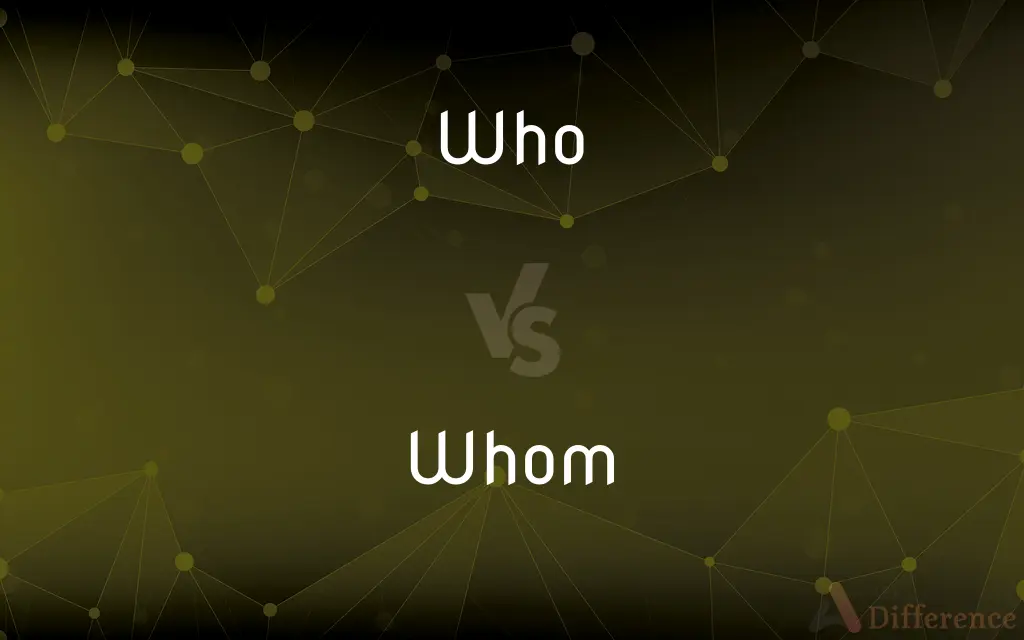Who vs. Whom — What's the Difference?
By Tayyaba Rehman — Updated on October 5, 2023
"Who" is used as a subject pronoun, while "whom" is used as an object pronoun. "Who" does something, and something is done to "whom."

Difference Between Who and Whom
Table of Contents
ADVERTISEMENT
Key Differences
Who" and "whom" both serve as relative and interrogative pronouns, but with distinct grammatical applications. "Who" acts as a subject, pertaining to the one executing an action, while "whom" pertains to the object, the one receiving an action or influenced by it.
"Who" often initiates questions when inquiring about the identity of a person performing an action. Conversely, "whom" is typically used to question the individual on the receiving end of an action, even though its usage has become more flexible in casual communication.
"Who" is widely used in both formal and informal contexts, standing as a recognizable and straightforward means to derive or provide information about an acting party. "Whom," though grammatically correct in certain structures, is often replaced by "who" in colloquial language due to perceived complexity or formality.
Grammatically, "who" will always be associated with a verb, indicating a direct action performed by the entity it represents. "Whom," on the other hand, associates with a preposition or is the object in a sentence, never acting but being acted upon.
While "who" maintains its relevance and application across various contexts, "whom" seems to be dwindling in commonplace usage, particularly in everyday spoken English, with many substituting it with "who" for simplicity and ease of understanding, though it retains its formal written application.
ADVERTISEMENT
Comparison Chart
Grammatical Function
Subject pronoun.
Object pronoun.
Associated with
Verb/action.
Preposition or is acted upon.
Usage in Questions
Identifies the actor.
Identifies the one acted upon or referred to.
Formality
Used in both formal and informal contexts.
Often reserved for more formal or written usage.
General Application
Widely applied and recognized.
Becoming less common in everyday language.
Compare with Definitions
Who
Interrogative pronoun asking which person.
Who told you that secret?
Whom
Interrogative pronoun asking which person, specifically as an object.
Whom did you see at the event?
Who
Utilized to create indirect questions regarding identity.
She wondered who the visitor could be.
Whom
Utilized to create indirect questions about the object of an action.
She didn't know whom to call.
Who
A pronoun introducing a clause, referring to a person.
Who is going to the store?
Whom
A pronoun used in questions about the recipient of an action.
Whom will you believe now?
Who
Used to specify, introduce a defining clause.
The person who called was looking for you.
Whom
Used instead of "who" as the object of a verb or preposition.
To whom was the letter addressed?
Who
What or which person or people
I wonder who that letter was from
Who is that woman?
Whom
Used instead of ‘who’ as the object of a verb or preposition
Her mother, in whom she confided, said it wasn't easy for her
Whom did he marry?
Who
Used to introduce a clause giving further information about a person or people previously mentioned
Joan Fontaine plays the mouse who married the playboy
Whom
(interrogative) What person or people; which person or people.
Who
(interrogative) What person or people; which person or people; asks for the identity of someone; used in a direct or indirect question.
Who is that? (direct question)
I don't know who it is. (indirect question)
Whom
As the object of a verb.
Whom did you ask?
Who
(relative) Introduces a relative clause having a human antecedent.
Whom
As the object of a preposition.
To whom are you referring?
With whom were you talking?
Who
With antecedent as subject.
That's the man who works at the newsagent. (defining)
My sister, who works in the accounts department, just got promoted to manager. (non-defining)
Whom
(relative) Used to refer to a previously mentioned person or people.
That is the woman whom I spoke to earlier. (defining)
Mr Smith, whom we all know well, will be giving the speech. (non-defining)
He's a person with whom I work. (defining)
We have ten employees, half of whom are carpenters. (non-defining)
Who
(non-formal) With antecedent as object: whom.
Whom
The person(s) whom; whomever.
To whom it may concern, all business of John Smith Ltd. has now been transferred to Floggitt & Runne.
Who
Whoever, he who, they who.
Who insults my mother insults me.
Whom
The objective case of who. See Who.
And every grass that groweth upon rootShe shall eke know, and whom it will do boot.
Who
A person under discussion; a question of which person.
Whom
Refers to a specified individual as an object.
The artist whom everyone admired was very humble.
Who
Whose
Who phone just rang?
Who
One; any; one.
As who should say, it were a very dangerous matter if a man in any point should be found wiser than his forefathers were.
Who
A United Nations agency to coordinate international health activities and to help governments improve health services
Who
Inquiring about the character or profession of someone.
Who does she think she is?
Common Curiosities
Are "passage" and "corridor" synonymous?
Largely, but "passage" might have broader uses.
Can "passage" refer to text?
Yes, "passage" can refer to a section of text.
Can "passage" imply a journey?
Yes, "passage" can refer to the act of passing from one place or stage to another.
Can "corridor" suggest a specific direction?
Often, corridors suggest a linear, continuous passage.
Does "passage" always denote physical movement?
No, it can be metaphorical, like "a passage of time."
Can "corridor" be used in transportation?
Yes, such as in “transportation corridor,” denoting a travel route.
Is "corridor" used in specific architectural contexts?
Yes, "corridor" typically refers to a hallway in a building.
Can "passage" imply a transient experience?
Yes, it might denote a brief or transitory occurrence.
Can "corridor" denote a limited path?
Typically, a corridor implies a constrained, defined pathway.
Can "corridor" refer to non-architectural concepts?
It's possible, e.g., in "corridor of power," but it's less common.
Can "passage" refer to a physical route?
Yes, "passage" can imply a way through which someone or something passes.
Is "corridor" used metaphorically?
Rarely. "Corridor" is mainly used in literal, physical contexts.
Can "passage" denote a right or opportunity?
Yes, it may refer to the permission or action of passing.
Is "corridor" related to specific architectural designs?
Usually, it's a long hallway that gives access to rooms.
Does "passage" have biological connotations?
Yes, it might refer to a pathway within an organism.
Share Your Discovery

Previous Comparison
Libellous vs. Libelous
Next Comparison
Intent vs. PurposeAuthor Spotlight
Written by
Tayyaba RehmanTayyaba Rehman is a distinguished writer, currently serving as a primary contributor to askdifference.com. As a researcher in semantics and etymology, Tayyaba's passion for the complexity of languages and their distinctions has found a perfect home on the platform. Tayyaba delves into the intricacies of language, distinguishing between commonly confused words and phrases, thereby providing clarity for readers worldwide.
















































